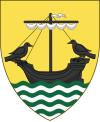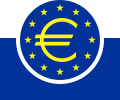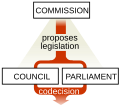Portal:European Union
Introduction
The European Union (EU) is a supranational political and economic union of 27 member states that are located primarily in Europe. The Union has a total area of 4,233,255 km2 (1,634,469 sq mi) and an estimated total population of over 449 million. The EU has often been described as a sui generis political entity combining the characteristics of both a federation and a confederation. Containing 5.8% of the world population in 2020, EU member states generated a nominal gross domestic product (GDP) of around US$16.6 trillion in 2022, constituting approximately one sixth of global nominal GDP. Additionally, all EU states except Bulgaria have a very high Human Development Index according to the United Nations Development Programme. Its cornerstone, the Customs Union, paved the way to establishing an internal single market based on standardised legal framework and legislation that applies in all member states in those matters, and only those matters, where the states have agreed to act as one. EU policies aim to ensure the free movement of people, goods, services and capital within the internal market; enact legislation in justice and home affairs; and maintain common policies on trade, agriculture, fisheries and regional development. Passport controls have been abolished for travel within the Schengen Area. The eurozone is a group composed of the 20 EU member states that have fully implemented the economic and monetary union and use the euro currency. Through the Common Foreign and Security Policy, the union has developed a role in external relations and defence. It maintains permanent diplomatic missions throughout the world and represents itself at the United Nations, the World Trade Organization, the G7 and the G20. Due to its global influence, the European Union has been described by some scholars as an emerging superpower. In 2012, the EU was awarded the Nobel Peace Prize. The United Kingdom became the only member state to leave the EU, in 2020; ten countries are aspiring or negotiating to join it. (Full article...) Selected article The Treaty of Lisbon or Lisbon Treaty (initially known as the Reform Treaty) is an international agreement which amends the two treaties which form the constitutional basis of the European Union (EU). The Lisbon Treaty was signed by the EU member states on 13 December 2007, and entered into force on 1 December 2009. It amends the Maastricht Treaty (also known as the Treaty on European Union) and the Treaty establishing the European Community (TEC; also known as the Treaty of Rome). In this process, the Rome Treaty was renamed to the Treaty on the Functioning of the European Union (TFEU). Prominent changes included the move from unanimity to qualified majority voting in several policy areas in the Council of Ministers, a change in calculating such a majority to a new double majority, a more powerful European Parliament forming a bicameral legislature alongside the Council of ministers under the ordinary legislative procedure, a consolidated legal personality for the EU and the creation of a long-term President of the European Council and a High Representative of the Union for Foreign Affairs and Security Policy. The Treaty also made the Union's bill of rights, the Charter of Fundamental Rights, legally binding. Selected pictureDid you know?...that within the Eurozone the European Central Bank has the exclusive authority to set monetary policy? ...that Greenland and United Kingdom are the only countries to ever leave the European Union? Selected cityLisbon is the capital and largest city of Portugal. It is the seat of the district of Lisbon and capital of Região Lisboa (Lisbon Region). Lisbon municipality has a population of 564,477, and the Lisbon Metropolitan Area in total has around 2,800,000 inhabitants, the largest urban aglomeration of Portugal. Lisbon Region is the wealthiest region in Portugal and it is well above the European Union's per capita GDP average. Lisbon hosts two important European Union agencies namely, the European Monitoring Centre for Drugs and Drug Addiction (EMCDDA) and the European Maritime Safety Agency (EMSA). The CPLP (Community of Portuguese Language Countries), is also headquartered in Lisbon. General imagesThe following are images from various European Union-related articles on Wikipedia.
TopicsFeatured contentFeatured articles
Featured lists
Featured contentGood articles
CategoriesRelated portalsAssociated WikimediaThe following Wikimedia Foundation sister projects provide more on this subject:
Discover Wikipedia using portals |

































































